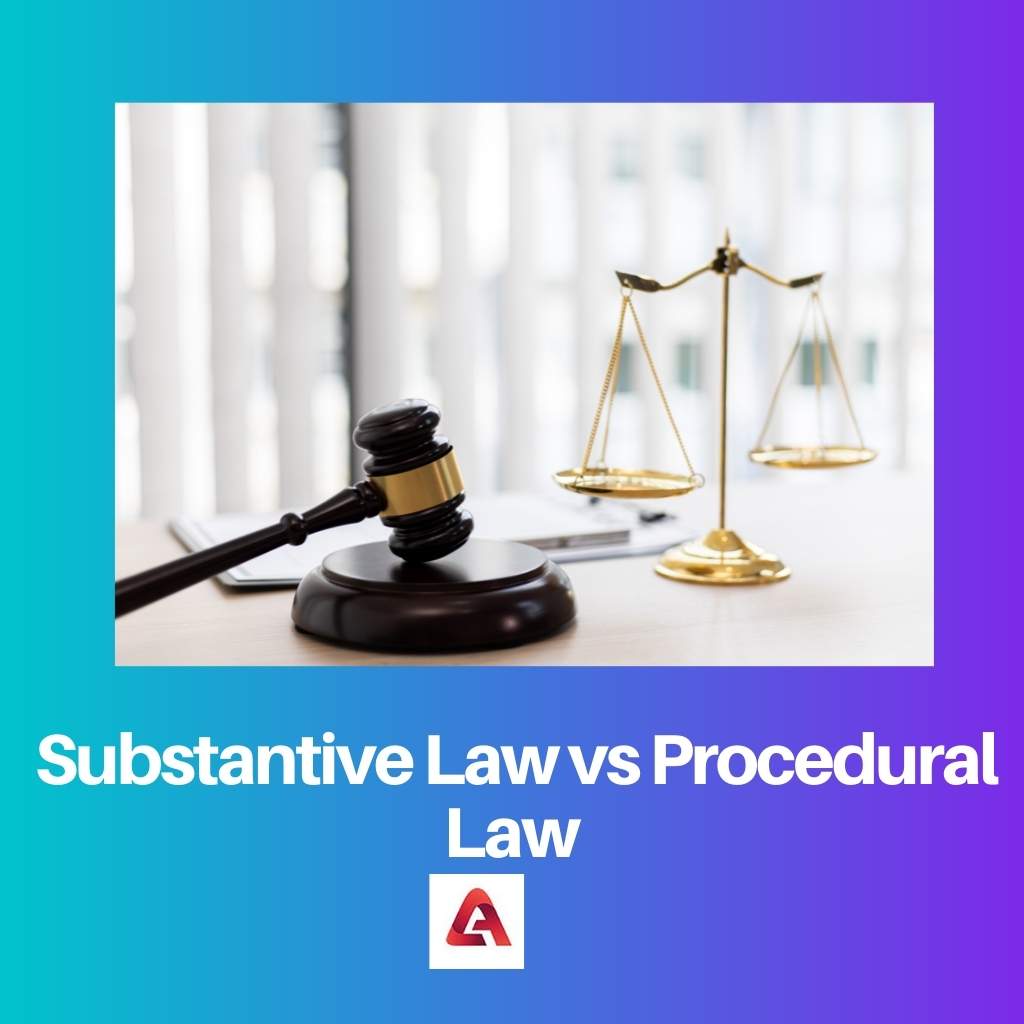The laws enforced by a governing body, like the state government, are broad, and they lay down the rules and regulations that vary completely on a case-by-case basis. The procedures that follow a violation depend on the type of law that has been broken and the level of violation committed.
Key Takeaways
- Substantive law defines the legal relationship between individuals or entities and their rights and obligations, while procedural law enforces those rights and obligations.
- Substantive law deals with the substance or essence of a case, while procedural law deals with the legal procedures that must be followed in resolving a case.
- Substantive law is concerned with the merits of a case, while procedural law is concerned with the legal process of bringing a case to court.
Substantive Law vs Procedural Law
The difference between Substantive Law and Procedural Law is that Substantive Law defines the penalizing factors by considering the crime committed and the damages made, whereas Procedural Law lays down the process that the case follows and how the punishment is actually given. Substantive Law gives the outline of the case, and Procedural Law sets the actual process.

Substantive Law is the basis on which the relationship between the state government and the individuals and individual to individual is defined. Thus, substantive law is the actual outline of the law, which defines all the rules and regulations that the citizens have to follow.
This categorizes the violations into different types. The Procedural Law defines the process that the court follows after the Substantive Law has been sentenced on any offender.
This includes all the court processes and practices done by the court to move the case forward. The methods defined by the procedural law are to be followed by the court and both parties involved in the particular case.
Comparison Table
| Parameter | Substantive Law | Procedural Law |
|---|---|---|
| Definition | Substantive law defines the rules and regulations, and duties that the citizens have to follow | Procedural law defines the processes that the court follows to move the particular case ahead |
| Function | These laws establish the functioning of the governing body | These laws set the court proceedings for a particular case |
| Superiority | Substantive law is superior as it establishes the ruling system | Procedural Laws are followed after the Substantive law has been sentenced |
| Variation | Substantive Laws do not change under any circumstance | Procedural Laws may differ from one case to another |
| Governance | Statutory laws are followed for governance | Governance is followed by the act of the governing body, parliament, court, etc |
What is Substantive Law?
Substantive Laws are the written laws that define the ruling and governing system of the governing body. These define the rules and regulations that every citizen of the country has to follow.
Substantive law is the basis upon which the governing authorities, such as the court, function. These establish the relations between the state and the individual and also the relationship between the individual and the individual.
These have the highest order of superiority when deciding the penalty that has to be given following any violation. These laws constitute the legal system that differentiates rightful and wrongful conduct, and thus all court proceedings depend upon the substantive law.
The procedural laws that follow after the case have been taken to court all depend upon the conclusion given after considering the substantive law. Thus the substantive laws lay down the governing system of the country, and this constitutes all the factors that are to be considered for punishing or enforcing a penalty for the violation of any law.
Substantive law is thus concerned with the substance of any case. Depending on the case and also on the consequent violation of any substantive law, the penalizing system can sentence the offender to the subsequent penalty or punishment.

What is Procedural Law?
Procedural Laws set the functioning of the court for moving a particular case ahead. The practices and processes followed by the court are defined by the procedural laws.
Procedural Laws are the functioning part of the legal system, as the court proceedings are made according to the procedural laws. Procedural Laws are given after sentencing the substantive law.
For example, if, for a particular case, the substantive law dictates a lawsuit against the offender, then the procedural laws define the methods and the procedure that the court follows for giving the subsequent lawsuit.
These laws thus differ from case to case, as the proceedings that the court will follow may differ depending upon the circumstances related to the case. The process may differ, but the final sentence will remain the same as it was given by the substantive law.
This law is thus applicable in a legal context only, as it outlines the functioning of the court after the violation or breaking of the law.
Thus this law follows below substantive law in order of superiority as substantive law dictates the actual act of violation and dictates the act as a criminal offense. The court proceedings are given after the substantive laws have been considered.

Main Differences Between Substantive Law and Procedural Law
- Substantive law is the set of rules and regulations, and the duties that the citizens have to follow. Procedural law outlines the functioning of the court following a particular case.
- Substantive law applies to both legal and non-legal contexts. Procedural law only applies to legal contexts, such as legal offences.
- The functioning of the governing body is established by the substantive laws. The court proceedings are laid out by the procedural laws.
- Substantive laws are superior to procedural laws as they deem an act as a violation or criminal offence.
- The initiation of a lawsuit is done by the substantive law. The punishment and penalty for the offence if given through procedural law.
- https://www.jstor.org/stable/1331381
- https://heinonline.org/hol-cgi-bin/get_pdf.cgi?handle=hein.journals/walq87§ion=29
- http://lawjournals.celnet.in/index.php/njcl/article/view/279
- https://books.google.com/books?hl=en&lr=&id=s2YrtoiyGcYC&oi=fnd&pg=PA11&dq=procedural+laws+in+india&ots=At8q7wRHuu&sig=SAw_0YFFSNYlEYJ15yjgYVR9dR8





